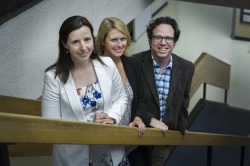Drug safety after the shelves

When medications hit the shelves, you’d assume they’ve been proven safe. But market withdrawal of several high profile medications has brought a heightened focus on drug safety.
Dr. J.M. Gamble along with two of his graduate students, Jennifer Donnan and Patricia Howse, recently received a total of $25,000 from the Newfoundland and Labrador Centre for Applied Health and Research to conduct a series of studies evaluating real world outcomes of the newer diabetes therapies.
Dr. Gamble will bring together an international team of researchers and build capacity in the area of benefit-risk assessment for drug therapies at Memorial University. This team includes Dr. Karissa Johnston from BroadStreet HEOR, Dr. Mehdi Najafezdeh from Harvard Medical School, Dr. Carlo Marra from the University of Otago and Dr. Kris Aubrey-Bassler, Ms. Michelle Swab and Ms. Jennifer Donnan from Memorial University. This team will conduct a pilot study and develop a series of competitive grant proposals to study the benefits and risks of antidiabetic therapies using state-of-the-art quantitative benefit-risk analysis methods.
“Currently there is no benchmark or gold standard approach for weighing all of the potential benefits and harms associated with drug therapies” explained Dr. Gamble. “We’ll be building research capacity and expertise in the area of benefit-risk assessment. An important aspect of this work will be developing expertise in eliciting patient preferences for drug therapies by conducting choice-based experiments.
Patricia Howse will be studying the comparative effectiveness of incretin-based therapies for patients with type 2 diabetes and chronic kidney disease. She will be using real world data from electronic medical records to the study the effectiveness of these newer diabetes therapies relative to older and less expensive diabetes medications.